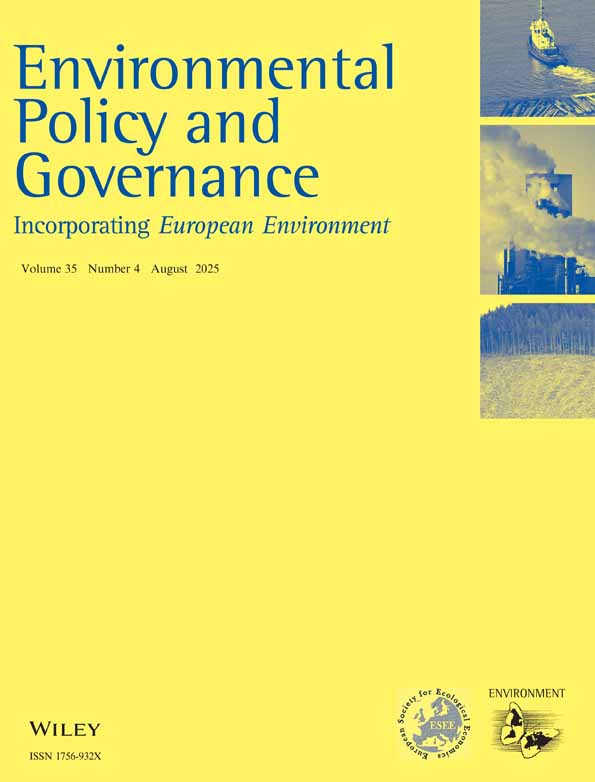The impact of emission trading on innovation – science fiction or reality?
Frank Gagelmann
Deutsche Emissionshandelsstelle (German Emission Trading Authority), Essen, Germany
Search for more papers by this authorCorresponding Author
Manuel Frondel
Rheinisch-Westfälisches Institut für Wirtschaftsforschung (RWI), Berlin, Germany
Rheinisch-Westfälisches Institut für Wirtschaftsforschung (RWI), Hohenzollernstrasse 1-3, D-45128 Essen, Germany.Search for more papers by this authorFrank Gagelmann
Deutsche Emissionshandelsstelle (German Emission Trading Authority), Essen, Germany
Search for more papers by this authorCorresponding Author
Manuel Frondel
Rheinisch-Westfälisches Institut für Wirtschaftsforschung (RWI), Berlin, Germany
Rheinisch-Westfälisches Institut für Wirtschaftsforschung (RWI), Hohenzollernstrasse 1-3, D-45128 Essen, Germany.Search for more papers by this authorAbstract
This article seeks to appraise the potential innovation impacts that may be triggered by the European emission trading system starting on 1 January 2005. To this end, our paper provides a review of the theoretical and empirical literature on the potential innovation effects triggered by the pioneering US emission trading schemes (ETS). Our review's basic empirical results are that the innovation effects were initially limited, partially because of lenient or even non-constraining targets in the first years, but there is empirical evidence on a vast range of low-cost compliance strategies. Yet, the substantial body of theoretical literature provides no consensus on the issue of whether or not emission trading generally triggers more innovation than other policy instruments, such as regulation standards. Copyright © 2005 John Wiley & Sons, Ltd and ERP Environment.
REFERENCES
- Arthur B. 1989. Competing technologies, increasing returns, and lock-in by historical events. Economic Journal 99: 116–131.
- Bader P. 2000. Europäische Treibhauspolitik mit handelbaren Emissionsrechten. Duncker & Humblot: Berlin.
- Banales-Lopez S, Norberg-Bohm V. 2002. Public policy for energy technology innovation. A historical analysis of fluidized bed combustion development in the USA. Energy Policy 30: 1173–1180.
- Burtraw D. 1996. The SO2 emissions trading program: ‘Cost savings without allowance trades’. Contemporary Economic Policy 14: 79–94.
- Burtraw D. 2000. Innovation Under the Tradable Sulfur Dioxide Emission Permits Program in the U.S. Electricity Sector, Resources for the Future Discussion Paper 00–38.
- Downing PB, White LJ. 1986. Innovation in pollution control. Journal of Environmental Economics and Management 13: 18–29.
- Ellerman AD. 2004. The U.S. SO2 Cap-and-Trade Programme. In Tradable Permits – Policy Evaluation, Design and Reform. Organisation for Economic Co-Operation and Development (OECD): Paris; 71–97.
- Ellermann AD, Joskow PL, Harrison D Jr . 2003. Emissions Trading in the U.S. Experience, Lessons and Considerations for Greenhouse Gases. Pew Center on Global Climate Change. VA.
-
Ellerman AD, Schmalensee R, Joskow PL, Montero JP, Bailey E. 2000. Markets for Clean Air: the U.S. Acid Rain Program. Cambridge University Press: Cambridge.
10.1017/CBO9780511528576 Google Scholar
- Energy Information Administration (EIA). (1999) Steam-Electric Plant Operation and Design Report 1998, Form EIA-767. Department of Energy (DOE), EIA: Washington, DC.
- Environmental Protection Agency (EPA). 2002. An Evaluation of the South Coast Air Quality Management District's Regional Clean Air Incentive Market – Lessons in Environmental Markets and Innovation. US EPA. Washington, DC.
- Fischer C. 2000. Climate Change Policy Choices and Technical Innovation, RFF Climate Issue Brief 20. Resources for the Future.
- Fischer C, Parry IWH, Pizer WA. 2003. Instrument choice for environmental protection when technological innovation is endogenous. Journal of Environmental Economics and Management 45: 523–545.
-
Gagelmann F, Hansjürgens B. 2002. Climate protection through tradable permits: the EU proposal for a CO2 emissions trading system in Europe. European Environment 12: 185–202.
10.1002/eet.294 Google Scholar
-
Hemmelskamp J. 1997. Environmental policy instruments and their effects on innovation. European Planning Studies 2: 177–194.
10.1080/09654319708720392 Google Scholar
- Jaffe AB, Newell RG, Stavins RN. 2002. Environmental policy and technological change. Environmental and Resource Economics 22: 41–69.
- Jung C, Krutilla K, Boyd R. 1996. Incentives for advanced pollution abatement technology and the industry level: an evaluation of policy alternatives. Journal of Environmental Economics and Management 30: 95–111.
- Kemp R. 1997. Environmental policy and technical change. A Comparison of the Technological Impact of Policy Instruments. Elgar: Cheltenham.
- Kemp R. 2000. Technology and environmental policy – innovation effects of past policies and suggestions for improvement. Paper presented at the OECD Workshop on Innovation and Environment, Paris, 2000.
- Keohane NO. 1999. Policy Instruments and the Diffusion of Pollution Control Technology, working paper, Harvard University.
- Keohane NO. 2002. Environmental Policy and the Choice of Abatement Technique: Evidence from Coal-Fired Power Plants, working paper, Yale School of Management.
- Kerr S, Newell R. 2003. Policy-induced technology adoption: evidence from the US lead phasedown. Journal of Industrial Economics 51(3): 317–343.
- Malueg DA. 1989. Emission credit trading and the incentive to adopt new pollution abatement technology. Journal of Environmental Economics and Management 16(1): 52–57.
- Milliman SR, Prince R. 1989. Firm incentives to promote technological change in pollution control. Journal of Environmental Economics and Management 17: 247–265.
- Montero J-P. 2002. Market structure and environmental innovation. Journal of Applied Economics 5(2): 293–325.
- Popp D. 2003. Pollution control innovation and the Clean Air Act of 1990. The Journal of Policy Analysis and Management 22(4): 641–660.
- Requate T, Unold W. 2003. Environmental policy incentives to adopt advanced abatement technology: will the true ranking please stand up? European Economic Review 47: 125–146.
- Schwarze R. 2001. Zur dynamischen Anreizwirkung von Umweltzertifikaten. Zeitschrift für Umweltpolitik und Umweltrecht 4: 501–536.
- Sorrell S, Skea J. 1999. Pollution for Sale. Emissions Trading and Joint Implementation. Elgar: Cheltenham; 1–24.
- Swift B. 2001. How environmental laws work: an analysis of the utility sector's response to regulation of nitrogen oxides and sulfur dioxide under Clean Air Act. Tulane Environmental Law Journal 14: 309–425.
- Taylor MR, Rubin ES, Hounshell DA. 2003. The effect of government actions on technological innovation for SO2 control. Environmental Science and Technology 20: 4527–4534.
- Unger S. 2004. RECLAIM Poised for Major Changes, Evolution Markets Executive Brief.




